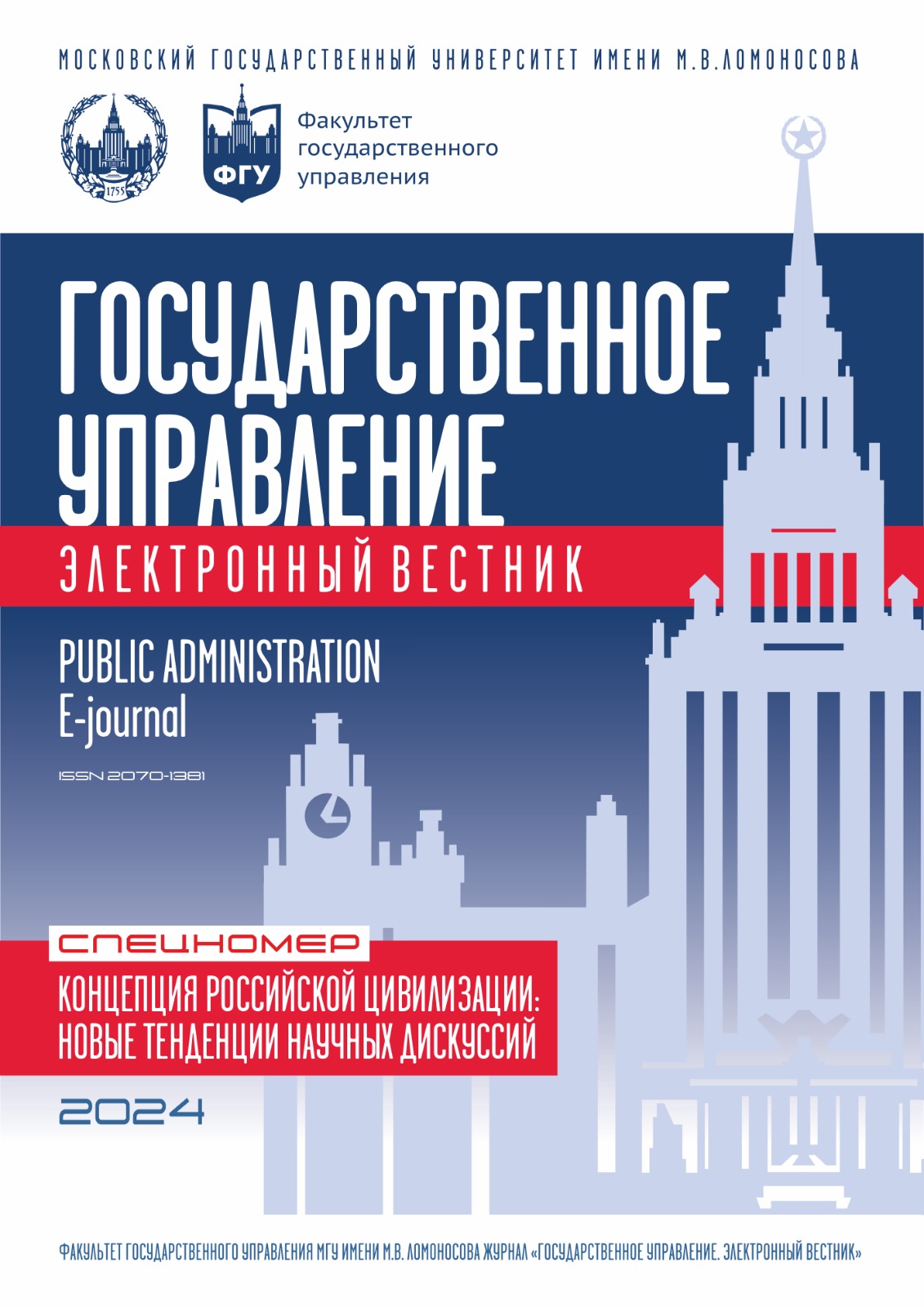Евразийская цивилизация: геоэкономические параметры концепции в условиях нового миропорядка
DOI:
https://doi.org/10.24412/5jnhjq73Ключевые слова:
Большая Евразия, геоэкономика, геоэкономическая регионализация, евразийская цивилизация, цивилизационный разлом, Украина.Аннотация
Статья подготовлена на базе выступления автора на Всероссийской конференции с международным участием «Концепция российской цивилизации», состоявшейся 22–23 января 2024 года на факультете государственного управления МГУ имени М.В. Ломоносова. В предлагаемом исследовании, по сравнению с выступлением, ставится ряд методологических вопросов, связанных с определением рамок развития евразийского пространства в контексте глобальных и региональных геоэкономических и геополитических процессов. Успешное формирование макрорегиона «Большая Евразия» в рамках процессов геоэкономической регионализации в актуальных условиях ценностного противоборства означает учет не только чисто геоэкономических факторов, но и целого ряда других обстоятельств историко-культурного, историко-экономического и социально-географического характера. В частности, это касается границ Большой Евразии и механизма их геоэкономической демаркации. Поднимается вопрос о необходимости интеграции евразийских подходов и современных геоэкономических подходов, положенных в основу формирования макрорегионов, — тенденции, которую Западу удалось замедлить, но не остановить. Особо акцентирована тема западной границы (фронтира) Евразии в рамках сформулированной автором гипотезы о существовании «Днепровского проторазлома», сочетающего в себе как социокультурные, так и пространственно-географические аспекты. Потенциал трансформаций, в том числе и силовых, заложенный в данном проторазломе, в настоящее время проявляется в ходе Специальной военной операции. Это диктует принципиальную необходимость изучения и творческой адаптации к современным условиям наследия философов-евразийцев, сформулировавших саму концепцию «Большой Евразии», но применительно уже к иной исторической реальности, а главное — к новой, преимущественно пространственной политической и экономической архитектуре.
Библиографические ссылки
Гумилев Л.Н. Этногенез и биосфера земли. СПб: Азбука, 2019.
Данилевский Н.Я. Россия и Европа. М.: Книга, 1991.
Евстафьев Д.Г. Глобализация и новые цивилизационные разломы: риски и перспективы для России и Евразии // Геополитика и экогеодинамика регионов. 2019. Т. 5(15). № 1. С. 22–33.
Ергин Д. Новая карта мира. Энергетические ресурсы, меняющийся климат и столкновение наций. М.: Интеллектуальная литература, 2021.
«Жить в двух мирах»: переосмысляя транснационализм и транслокальность / под ред. О. Бредникова, С. Абашина. М.: Новое литературное обозрение, 2021.
Кофнер Ю. География и геополитика Большой Евразии // Сообщество Большая Евразия. 2018. URL: https://gea.site/2018/05/687/?ysclid=lsycwkwg7v325565036
Кудряшова Д.А. Влияние Запада на постсоветское пространство: поступательное движение по смене культурного кода // Ближний и Постсоветский Восток. 2023. № 1(1). C. 113–128. DOI: 10.31249/j.2949-2408.2023.01.07
Купер Р. Раздор между народами. Порядок и хаос в XXI веке. М.: Московская школа политических исследований, 2010.
Спенс М. Следующая конвергенция. Будущее экономического роста в мире, живущем на разных скоростях. М.: Издательство Института Гайдара, 2013.
Фукуяма Ф. Идентичность: Стремление к признанию и политика неприятия. М.: Альпина Паблишер, 2019.
Huntington S. The Clash of Civilizations and the Remaking of World Order. New York: Simon&Shuster, 1996.
Загрузки
Опубликован
Выпуск
Раздел
Категории
Похожие статьи
- Кудина Марианна Валерьевна, Касымов Азрет Шамильевич, Венчурный капитал в условиях ESG-трансформации , Государственное управление. Электронный вестник: № 93 (2022)
- Данилюк Елена Сергеевна, Сопоставление полномочий органов местного управления Республики Беларусь с показателями оценки эффективности их работы , Государственное управление. Электронный вестник: № 87 (2021)
- Силакова Любовь Владимировна, Антипов Антон Александрович, Пузанова Виктория Михайловна, Иванов Артем Вацлавович, Развитие предпринимательской культуры в контексте трансформации университетов: кейс Университета ИТМО , Государственное управление. Электронный вестник: № 113 (2025)
- Горин Николай Владимирович, Водолага Борис Константинович, Кучинов Владимир Петрович, Шидловский Владимир Владиславович, Атомная энергетика как основа устойчивого развития , Государственное управление. Электронный вестник: № 95 (2022)
- Соколов Алексей Олегович, Индикаторы экономической целесообразности формирования наднациональных организационно-правовых форм в Евразийском экономическом союзе , Государственное управление. Электронный вестник: № 89 (2021)
- Молчанов Игорь Николаевич, Человеческий потенциал и перспективы развития образования , Государственное управление. Электронный вестник: № 89 (2021)
- Пивоварова Марина Борисовна, Цифровизация научной и образовательной среды: управленческие аспекты , Государственное управление. Электронный вестник: № 89 (2021)
- Лапидус Лариса Владимировна, Роль технологических инноваций в развитии бизнеса и цифровой трансформации в странах Евразийского экономического союза , Государственное управление. Электронный вестник: № 95 (2022)
- Кондрашов Павел Евгеньевич, Майоров Алексей Николаевич, Совершенствование регламентации учебной нагрузки обучающихся по программам общего образования , Государственное управление. Электронный вестник: № 94 (2022)
- Кайсарова Валентина Петровна, Винокурова Мария Юрьевна, Профессиональное развитие цифровых компетенций современных государственных служащих: российский и зарубежный опыт , Государственное управление. Электронный вестник: № 88 (2021)
Вы также можете начать расширеннвй поиск похожих статей для этой статьи.




